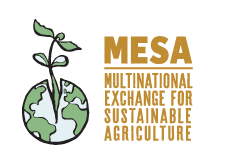MESA Alumni are spreading agroecology and food sovereignty around the world! From Peru to Kenya, here is how two Alums are sharing their talents and expertise.
Peris Nderitu, Kenya
MESA Steward 2011
This past December, former MESA Steward Peris Nderitu facilitated a “Culinary Art Skills Exchange” on traditional food and seeds from Eastern and Southern Africa. Facilitated by the agriculture biodiversity community (abc) in partnership with the Farmers Association of Community Self-Help Invest Groups (FACHIG Trust), the training was organized “based on the need for community knowledge to be shared and generated” in the fa
Carried out over three days, this workshop taught the 15 participants about preparing a weekly menu based on traditional, nutrient-rich crops. Peris started the workshop at the roots with an introduction to nutrition with the theme: “Grow your soil, the soil grows your crops and the crops grow you.” Soil health and crop rotation were important elements for the participants who grow and farm their own ingredients. Other topics included menu design, food storage, and health tips. Then the action started: the participants prepared a series of dishes to serve for breakfast, lunch, dinner, and snacks for one week.
Participants left equipped with the skills and conviction to prepare these healthy foods for their families. Sharing the value, importance, and use of traditional food crops is a way to strengthen food sovereignty. Instead of depending on imported or highly processed foods, re-integrating local seeds, grains, fruits, and vegetables into the diet promotes healthy eating and diversified farming.
Congratulations, Peris, for your great work in advancing food sovereignty and healthy nutrition in Kenya!
To read the full workshop report, see more pictures, and find recipes for all the dishes prepared, click here.
María Fernandez, Peru
MESA Steward 2006
María Fernandez Poquis does not let a moment go to waste. As President of the Regional Association of Ecological Producers of the Amazon, a branch of Peru’s National Association of Ecological Producers (ANPE-P
Working with the local municipality, university, and women’s groups, María led the committee to coordinate the logistics and production of this fair. Producer groups came from all over the region, showcasing local products including traditional dishes, coffee, chocolate, woven baskets, dairy products, fruits and vegetables, jams, and cuyes (Peruvian guinea pigs). As María reported, all the participants came “with our typical dress which represent our origins that we are recovering.”
The fair was a big success – despite an afternoon thunderstorm – with many members of the public coming to share in the festivities and purchase products. Some of the more popular products like raw cane sugar, yogurt, and cuy were sold out within the first day, making it a successful experience for the producers.
Fairs and markets such as these are crucial to providing a market for agro-ecological producers and informing the public about the benefits of ecologically-produced food. In addition, it becomes a space of cultural heritage and exchange.
María is now co-organizing
Congratulations, María, for all your hard work to advance agroecology throughout Peru! Adelante!
To find out more about the upcoming Pan-Amazonic Forum, visit their website here.
To stay updated on the work of ANPE-Peru and their regional initiatives through Frutos de la Tierra, follow them on Facebook here.



